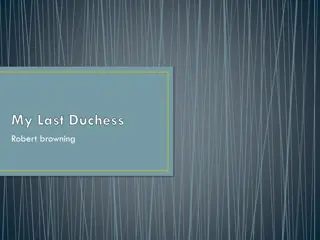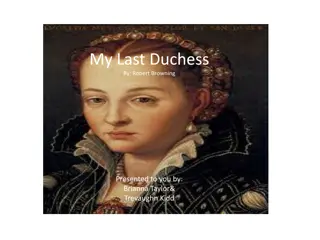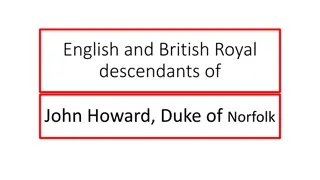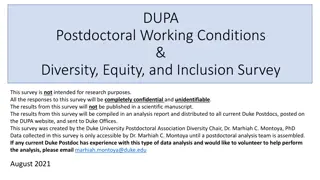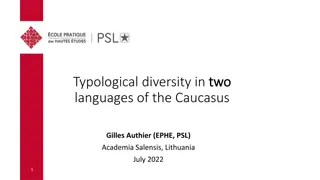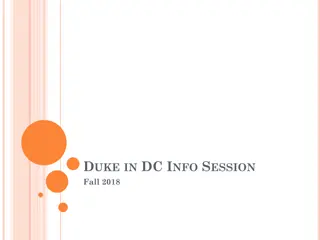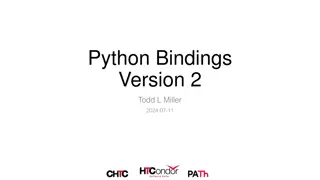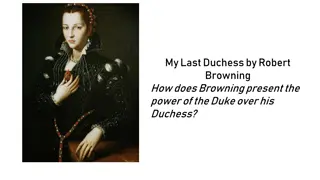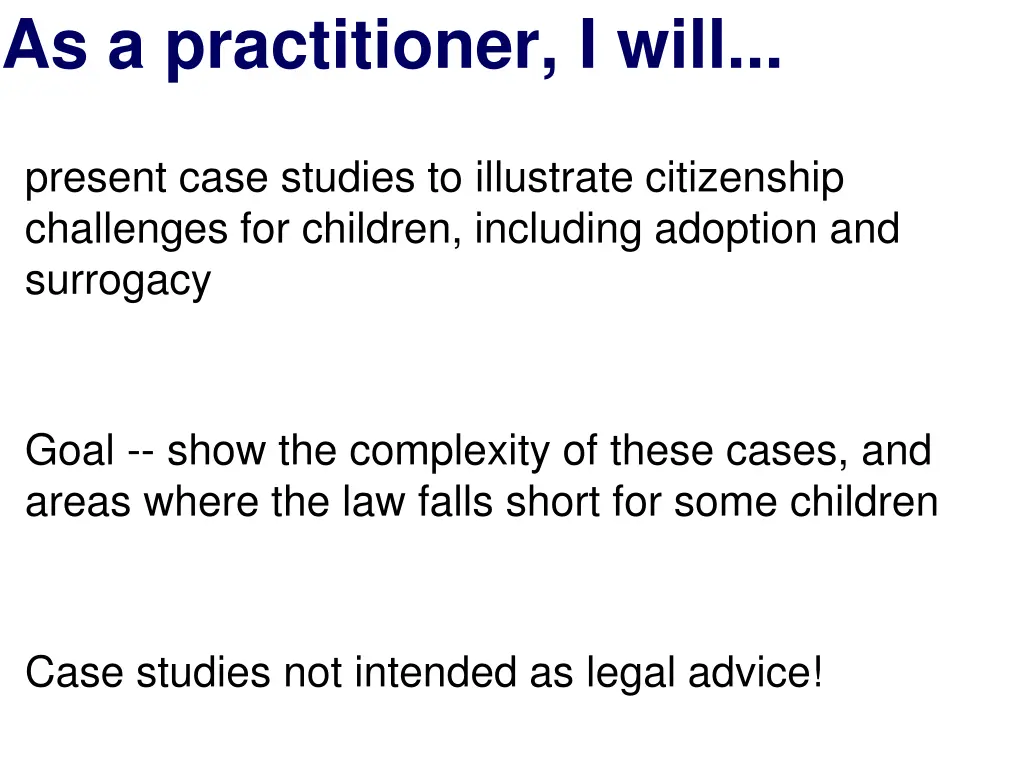
Citizenship Challenges for Children: Legal Complexities & Case Studies
Explore citizenship challenges faced by children including adoption, surrogacy, and legal complexities through case studies. Understand where the law falls short in protecting children's rights. Resources and real-life scenarios shed light on the intricate nature of citizenship issues.
Download Presentation

Please find below an Image/Link to download the presentation.
The content on the website is provided AS IS for your information and personal use only. It may not be sold, licensed, or shared on other websites without obtaining consent from the author. If you encounter any issues during the download, it is possible that the publisher has removed the file from their server.
You are allowed to download the files provided on this website for personal or commercial use, subject to the condition that they are used lawfully. All files are the property of their respective owners.
The content on the website is provided AS IS for your information and personal use only. It may not be sold, licensed, or shared on other websites without obtaining consent from the author.
E N D
Presentation Transcript
As a practitioner, I will... present case studies to illustrate citizenship challenges for children, including adoption and surrogacy Goal -- show the complexity of these cases, and areas where the law falls short for some children Case studies not intended as legal advice!
Resources USCIS Guide to Naturalization, and Citizenship for Adopted Children DOS website on Child Citizenship Act ILRC and AILA books
Need to do detective work to examine law at the time of the child s birth Prof. Mackenzie: Canadian citizen, teaches at Jones College in Tennessee; working through TN status under NAFTA, but worries about the President s statements. College starts a streamlined green card process. Both his parents were born in Michigan, lived in the United States through the 1950s, then settled in Canada. Based on the law at the time, he was a US citizen, and lost it by moving to Canada. But he can regain it by swearing an oath to the US at the US consulate in Toronto.
Even better when used defensively in removal proceeding Oliver is from New Zealand, and moved to the US to work as a physician s assistant on an H-1B visa. He married a US citizen, filed for a green card and obtained a temporary work card. To save money, his employer did not extend the H-1B. Unfortunately, the marriage ended suddenly, leaving him out of work, out of status, and in immigration court. Waiting for the hearing, he grumbled to his attorney how ironic this is since his grandfather fought in the US Army in WWII. Oliver s family had move to NZ during the Vietnam War, but he was a US citizen at birth.
Sometimes the detective work needs to be done quickly (inside the US)! Grace is 18, and has just started college in the US. She arrived in the US a few weeks ago on the Visa Waiver program. She was born in Monaco - her father was a US citizen, and her mother was French. The parents were married and living in Monaco at the time. Soon after, the father had the marriage annulled and moved back to the United States. The parents never obtained a Consular Report of Birth Abroad, and now face trying to document whether Grace was a citizen at birth quickly by applying for a US passport. .
Sometimes the detective work needs to be done quickly (outside the US)! Yejin is a US citizen who obtained her green card years ago through marriage to a US citizen. She lived in the US for about 5 years in her 20s. Now she is back home in China, and has a 6 year old son. She wants him to go to the American School but he needs to be a US citizen for preferred admission. She files an N600k, with the best evidence she can get of having lived in the US, and hopes for an interview in the US as soon as possible.
Sometimes digging into the past leads to unpleasant surprises Moustapha is an international student. He was born in the US while his father was working for the Kenyan embassy in Washington. The family was only in the US for a few months after Tapha was born. But, Tapha has a DC birth certificate, and used that to get a US passport. He has filled out his FAFSA forms as a US citizen and voted for Barack Obama (who he had actually seen as a small child in Kenya) in 2012. He applies to renew his US passport, and gets a letter saying he is a Blue List child. He is not a US citizen based on 14th Amendment birthright.
Surrogacy - new fact patterns the law had not anticipated A same sex couple lives in the UK. Sue is a US citizen and Margaret is British. Sue is pregnant and delivers a baby. The sperm and egg were both donated. Sue had lived most of her life in the United States before following Margaret to the UK. New interpretation! Gestational mother can confer citizenship even if no genetic link to the baby
Surrogacy continued A US couple, Mark and Justin, contracted for surrogacy in India, using Mark s sperm. After the baby, Marjorie, was born, the parents obtained an Indian birth certificate with Mark s name as the parent, and applied for a US passport. Genetic testing was ordered - the baby was not genetically related to Mark. They obtained Humanitarian Parole to bring Marjorie to the US, then applied for a paternity declaration in California. Their immigration lawyer filed for a green card for Marjorie based on her having been abandoned by her genetic parents (unknown). Hold on to your hats...
USCIS said no, because that Marjorie was already a US citizen by virtue of the paternity declaration since it meets the definition of adoption - a court proceeding that: creates a legal permanent parent-child relationship between a child and someone who is not already the child s legal parent; terminates the legal parent-child relationship with the prior legal parent; and accomplishes points 1 and 2 under the law of the country or place granting the adoption. 2012 USCIS Memo and Matter of Mozeb (1975 case).
3 kids - 3 different outcomes Stefanie was born in Burundi, and came to the US at age 11 as part of a scholarship program. She lived with a host family in Maine with a one year student visa to attend the local public middle school. Stefanie had grown up in an orphanage, and by the end of the school year she had bonded with her host family. They adopted her, and raised her. She graduated with a vocational degree, and set up her own hair cutting business, and bought a house. At age 22, the state started to ask for more documents to renew her driver s license. She has no status, and no easy way to get status.
Some hope for this one Sokna, age 14 comes to the US from Cambodia on a student visa to attend private high school, and live with his aunt and uncle in Nebraska. He loses touch with his genetic parents, and bonds with his aunt and uncle. They adopt Sokna before age 16. The family waits for 2 years of legal and physical custody, and files for a green card (if approved, then automatic citizenship). USCIS denies, questioning whether there is a bona fide parent- child relationship. USCIS notes that Sokna s aunt and uncle had filed green card applications for Sokna s genetic parents several years ago, alleging that the adoption was a way to get around long waiting times.
And for #3, the Child Citizenship Act of 2000 saved the day Alex was born in Guatemala in 1999 and adopted by US citizens. Through CCA, he was automatically a US citizen on arrival in the US, and he got a US passport . His parents never applied for a Certificate of Citizenship for him - and at age 17, learned that would be a good idea to update all government databases. He filed N600 for $1170. Since he was over age 14, had to attend a swearing in ceremony, which was a memorable experience..
And last, undocumented parents Nayeli came to the US with her father Moises from Honduras, and they are both undocumented. Nayeli is now 7, and Moises is afraid of what might happen if he is detained. Until last year, there was a general policy of ICE not leaving young children alone, but recently in their area undocumented parents had been detained just after dropping their children off at school. Moises boss Elizabeth is like a grandmother to Nayeli, and offers to adopt her. Several problems here (2 years of physical custody requirement, need to finish green card abroad, etc.)




